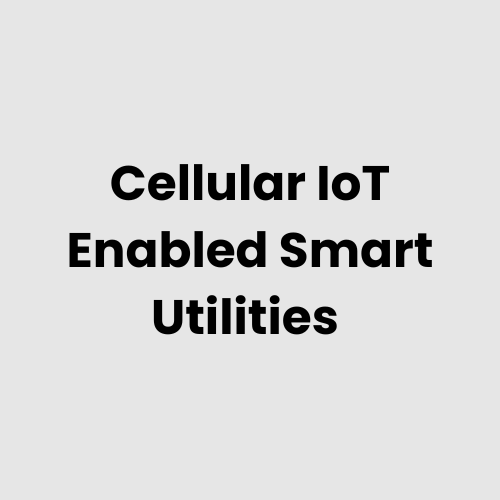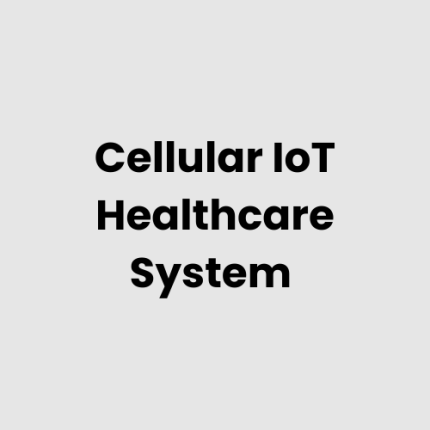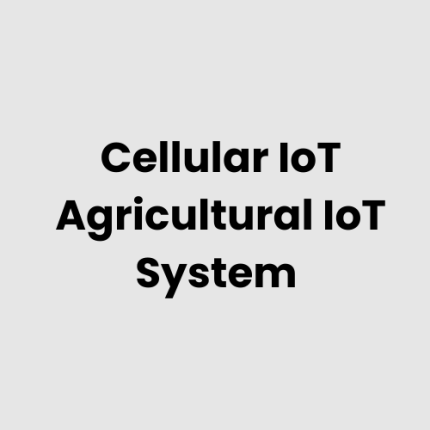Description
Technical Architecture of Cellular IoT Enabled Smart Utilities
Cellular IoT Enabled Smart Utilities integrate advanced IoT sensors, connectivity modules, edge computing, and cloud platforms to monitor and manage utilities efficiently. The architecture includes:
- IoT Endpoints: Devices like smart meters, temperature sensors, and leak detectors equipped with cellular connectivity modules.
- Edge Gateways: Collect, preprocess, and securely transmit data to cloud platforms via 4G, 5G, or NB-IoT
- Cloud Integration: Centralized platforms for data analytics, visualization, and decision-making.
- Control Systems: Actuators and controllers for real-time utility management.
At GAO Tek, we ensure seamless integration between these components to offer robust solutions tailored to customer needs.
Hardware Components of Cellular IoT Enabled Smart Utilities
The system leverages a suite of advanced hardware:
- IoT Devices: Smart meters, flow sensors, temperature monitors, and utility controllers.
- Connectivity Modules: 4G/5G/NB-IoT modules for cellular communication.
- Edge Gateways: Multi-protocol gateways with edge computing capabilities.
- Servers: For local data processing and storage in specific use cases.
- Power Backup Units: Ensuring uninterrupted operation.
- Antennas: High-gain antennas for enhanced cellular signal strength.
Physical Placement Considerations
- IoT Devices: Installed at utility nodes such as pipelines, energy meters, and distribution points. Ensure protection from environmental factors like heat, moisture, or vibration.
- Edge Gateways: Positioned in centralized or semi-centralized locations for optimal signal coverage and data collection efficiency.
- Antennas: Strategically placed in open spaces or elevated positions to maximize signal reception.
- Local Servers: Secured within utility control rooms with regulated temperature and humidity.
GAO Tek hardware solutions are designed for flexible installation to suit diverse utility environments.
Hardware Architecture
The hardware architecture of Cellular IoT Enabled Smart Utilities includes:
- Distributed IoT Network: A network of interconnected smart devices equipped with cellular modules.
- Gateway Nodes: Hierarchically placed to aggregate data from nearby IoT endpoints.
- Processing Units: Both edge devices and cloud systems for real-time analytics.
- Power Management: Backup systems integrated to mitigate outages.
This layered architecture ensures scalability and fault tolerance, allowing GAO Tek to meet the evolving demands of the utility sector.
Deployment Considerations
- Network Availability: Analyze the coverage of 4G, 5G, or NB-IoT networks in the deployment area.
- Data Security: Implement encryption protocols for secure data transmission and storage.
- Energy Efficiency: Opt for devices with low power consumption, crucial for battery-operated IoT devices.
- Scalability: Ensure the system accommodates additional devices or features without performance degradation.
- Regulatory Compliance: Adhere to industry standards and local government regulations.
GAO Tek provides onsite and remote support to streamline deployments.
Relevant Industry Standards and Regulations
- ISO/IEC 27001
- FCC Regulations
- IEEE 802.15.4
- ITU-T Y.2060
- NIST IoT Cybersecurity Standards
- IEC 62443
Local Server Version
A local server version offers enhanced control and data privacy. The system operates with on-premise servers for real-time data processing and analytics. Ideal for enterprises prioritizing data sovereignty or operating in areas with intermittent cellular connectivity. GAO Tek provides hardware and software solutions for local server implementations, ensuring compliance with stringent security standards.
Cloud Integration and Data Management
Cellular IoT Enabled Smart Utilities seamlessly integrate with cloud platforms for centralized data management. The cloud enables:
- Scalable Data Storage: Securely manage vast datasets with real-time accessibility.
- Advanced Analytics: Utilize AI/ML tools for predictive maintenance and performance optimization.
- Global Access: Monitor and control utilities from any location with internet access.
- Integration with Third-Party Tools: APIs and SDKs allow smooth integration with enterprise software.
GAO Tek ensures reliable and secure cloud integration, delivering cutting-edge IoT solutions for global customers.
GAO Case Studies of Cellular IoT Enabled Wearables IoT
USA Case Studies
- Chicago, Illinois
In Chicago, a healthcare organization implemented Cellular IoT-enabled wearables to monitor chronic illness patients remotely. These devices provided real-time vitals tracking, reducing frequent hospital visits and improving outcomes. Explore GAO Tek’s healthcare IoT solutions. - Austin, Texas
A construction company in Austin enhanced worker safety using IoT-enabled wearables that monitored environmental conditions and worker biometrics. GAO Tek’s IoT expertise ensures seamless safety-focused applications. - San Francisco, California
A tech startup in San Francisco used wearables for urban mobility tracking, optimizing public transport routes. GAO Tek’s solutions process and analyze high-volume data effectively. - Boston, Massachusetts
A Boston research institution gathered real-time patient health data using IoT-enabled wearables for clinical trials. GAO Tek provides reliable IoT infrastructure for such data-intensive projects. - Denver, Colorado
Outdoor adventure companies in Denver integrated IoT-enabled wearables for location tracking, enhancing customer safety. GAO Tek’s technologies support such real-time tracking applications. - Miami, Florida
Miami elder care facilities used wearables to monitor residents’ health metrics. Cellular IoT ensured instant alerts to caregivers. Learn more about GAO Tek’s healthcare applications. - Seattle, Washington
In Seattle, logistics companies deployed IoT wearables for fatigue monitoring, improving workplace safety. GAO Tek’s solutions ensure reliable monitoring systems. - Atlanta, Georgia
Fitness programs in Atlanta used wearables to track participants’ activity levels, tailoring fitness plans for improved outcomes. GAO Tek’s IoT solutions support personalized monitoring. - Houston, Texas
Emergency response teams in Houston adopted wearables for real-time biometrics tracking during disaster recovery. Explore GAO Tek’s mission-critical IoT applications. - Phoenix, Arizona
Phoenix’s community healthcare programs used IoT wearables to track maternal health metrics, ensuring timely interventions. GAO Tek empowers public health initiatives with precise data transfer. - Detroit, Michigan
An auto manufacturer in Detroit implemented wearables for productivity tracking, optimizing production workflows. - Nashville, Tennessee
IoT wearables in a Nashville hospital enabled continuous pediatric monitoring, alerting caregivers to critical condition changes. - New York City, New York
A retail chain in NYC piloted wearables to optimize customer flow analysis, enhancing shopping experiences. GAO Tek’s IoT expertise ensures effective implementations. - Los Angeles, California
In Los Angeles, schools monitored student wellness using wearables. Cellular IoT provided secure, real-time updates to parents. Discover GAO Tek’s IoT applications. - Las Vegas, Nevada
Las Vegas hotels enhanced staff communication and guest assistance using wearables. GAO Tek supports hospitality IoT deployments.
Canada Case Studies
- Toronto, Ontario
In Toronto, a sports facility tracked athlete performance using IoT wearables, enabling data-driven coaching strategies. GAO Tek ensures seamless operation for such applications. - Vancouver, British Columbia
A Vancouver healthcare startup monitored post-surgery recovery metrics with wearables, improving patient outcomes. Learn more about GAO Tek’s IoT capabilities.
GAO Case Studies of Cellular IoT Enabled Smart Cities
United States
- Los Angeles, California
In Los Angeles, the implementation of a smart water management system has helped reduce water wastage and improve maintenance schedules. Using IoT sensors integrated through cellular technology, real-time monitoring of water pipelines has allowed for early detection of leaks, optimizing repairs and resource management, which can lead to significant operational savings. - Austin, Texas
The city of Austin deployed a smart grid system that utilizes Cellular IoT for real-time monitoring of energy consumption. The system enables better management of the grid, allowing for dynamic energy distribution and reducing peak demand. This solution improves efficiency, cuts operational costs, and helps the city reduce its carbon footprint. - Denver, Colorado
Denver leveraged IoT-enabled sensors to monitor its waste management infrastructure, ensuring optimal pickup schedules and efficient waste collection. Cellular IoT provided remote monitoring capabilities, resulting in reduced fuel consumption, fewer missed pickups, and overall operational cost savings. This approach helps enhance the city’s sustainability efforts. - Seattle, Washington
Seattle has integrated Cellular IoT into its smart lighting infrastructure, allowing for real-time data collection on energy usage and operational status. By optimizing the lighting system and adjusting based on traffic patterns and weather conditions, the city has reduced energy consumption and operational expenses while improving street lighting efficiency. - New York City, New York
In New York, the deployment of smart traffic management systems using Cellular IoT has improved flow management and reduced congestion. IoT sensors monitor real-time traffic data, allowing for dynamic control of traffic lights and adjustments based on demand. This helps reduce traffic delays and air pollution, benefiting the city’s transportation infrastructure. - Chicago, Illinois
Chicago adopted Cellular IoT technology for its environmental monitoring network, tracking air and water quality across the city. Real-time data allows the city to respond promptly to pollution spikes, providing residents with up-to-date information on environmental health and enabling more effective public health responses. - San Francisco, California
The city of San Francisco utilizes IoT sensors for waste management, optimizing collection routes by monitoring container fill levels. Cellular IoT technology provides real-time communication, allowing for data-driven decision-making. This system reduces waste overflow and operational costs, contributing to the city’s broader sustainability goals. - Boston, Massachusetts
Boston’s smart energy management system leverages Cellular IoT sensors to monitor and optimize building energy use. By gathering real-time data from HVAC systems, the city can adjust settings to ensure energy-efficient operation while reducing costs for both public buildings and private sector facilities. - Miami, Florida
Miami implemented a Cellular IoT-based solution to track flooding and monitor drainage systems, using sensors to measure water levels in real time. The system provides crucial data to authorities, improving disaster preparedness and response while reducing the risk of flooding in vulnerable areas of the city. - Houston, Texas
In Houston, Cellular IoT solutions are being used for water quality monitoring throughout the city’s treatment and distribution systems. With real-time updates on water conditions, the system allows for quick responses to any changes, ensuring high-quality water and minimizing service disruptions for residents. - Dallas, Texas
Dallas utilizes Cellular IoT technology for tracking and managing public infrastructure, including streetlights and utility lines. With real-time diagnostics, the city can monitor the performance of key assets, reduce maintenance costs, and improve public safety by ensuring uninterrupted services. - Orlando, Florida
Orlando’s integration of Cellular IoT in its waste management system optimizes garbage collection routes based on real-time data from smart sensors embedded in bins. This system not only reduces operational costs but also contributes to a cleaner, more efficient city. - Washington, D.C.
Washington, D.C. employed Cellular IoT for smart city lighting solutions. The technology enabled sensors to adjust the intensity of streetlights based on environmental factors such as time of day and traffic, optimizing energy consumption and contributing to the city’s sustainability targets. - Phoenix, Arizona
Phoenix applied Cellular IoT to enhance its water management system, using sensors to monitor and control the flow of water throughout the city. The system allows for real-time adjustments to water distribution, reducing wastage and ensuring that water is delivered efficiently to areas in need. - Indianapolis, Indiana
Indianapolis adopted a Cellular IoT solution for monitoring air quality in urban areas. IoT sensors track pollutants and send data to the central system, helping local authorities make timely decisions to mitigate health risks and protect the environment, ensuring a cleaner, healthier city.
Canada
- Toronto, Ontario
In Toronto, Cellular IoT technology is used for smart waste management systems, helping the city monitor trash levels and optimize pickup schedules. With real-time data, the city can adjust collection routes, reduce fuel consumption, and enhance overall operational efficiency. - Vancouver, British Columbia
Vancouver adopted a smart water metering solution based on Cellular IoT technology to monitor consumption and detect leaks in real time. This approach improves billing accuracy and reduces water loss, contributing to more sustainable water usage across the city.
GAO Tek Inc., headquartered in New York City and Toronto, Canada, continues to innovate in the realm of smart city technologies, bringing cutting-edge solutions to municipalities across North America. With over four decades of expertise in research and development, our systems and products have empowered numerous cities to improve infrastructure, reduce costs, and enhance sustainability. As one of the top 10 leading suppliers of advanced B2B and B2G technologies globally, we are committed to delivering the highest quality solutions and expert support to our customers.
Navigation Menu for Cellular IoT
- Cellular IoT Accessories
- Cellular IoT Devices
- Cellular IoT – Cloud, Server, PC & Mobile Systems
- Cellular IoT Resources
Navigation Menu for IoT
- LORAWAN
- Wi-Fi HaLow
- Z-WAVE
- BLE & RFID
- NB-IOT
- CELLULAR IOT
- GPS IOT
- IOT SENSORS
- EDGE COMPUTING
- IOT SYSTEMS
Our products are in stock and can be shipped anywhere in the continental U.S. or Canada from our local warehouse. For any further information, please fill out this form or email us.
We are looking for partners. For more information on partnering with GAO, please visit Partner with GAO Tek Inc. It lists various ways to partner with GAO, such as OEM Partnerships, Technology Integration, Distribution and Reselling Opportunities, Presenting at the Leading Event Tek Summit, Joint R&D Projects, Training and Consulting Services, Industry-Specific Collaborations, Research and Academic Partnerships.



